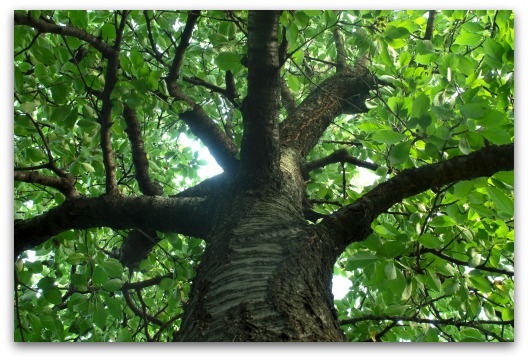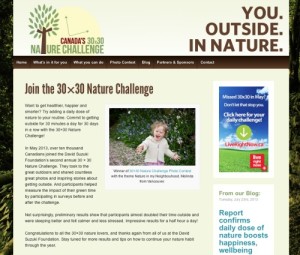Using a challenge to raise awareness and inspire action [case study]
In 2013, the David Suzuki Foundation 30×30 Nature Challenge went from a local experiment to a successful nation-wide campaign. The nonprofit challenged participants to commit to getting out into nature for 30 minutes a day for 30 consecutive days. More than 10,000 Canadians and over 250 workplaces participated in the challenge, doubling their time spent outdoors and as a result, feeling happier, more energetic and more positive.
Starting as a pilot campaign
The 30×30 Nature Challenge was created and piloted in June 2012 by the David Suzuki Foundation’s Toronto team. With growing scientific evidence supporting the idea that time in nature improves mood and reduces stress, and an organizational commitment to maintaining natural assets in and around cities, the team identified a challenge as a good way to communicate the idea that nature is good for us.
“The David Suzuki Foundation is quite entrepreneurial. We’re lucky; if someone has an idea, we have the space to test it out,” explains Aryne Sheppard of the Foundation. “We ran a successful campaign in 2012, with 1,500 people taking the survey and joining. Having identified the strength and success of the idea, we decided to build and develop the campaign and take it across the country in 2013.”
The 2013 campaign elements
In 2013, the 30×30 Nature Challenge took place in May. In addition to the primary audience of Generation X women from 2012, a second target audience, employees in workplaces, was added. The 2013 campaign included a number of key elements:
Microsite: A 30×30 Nature Challenge microsite served as the campaign hub.
Survey: The Foundation worked with researcher Dr. Elizabeth Nisbet from Trent University to analyze how time in nature affected well-being and ‘nature relatedness’, by inviting participants to complete surveys before and after the challenge.
Social media: Complementing the information offered on the microsite, participants also received tips on how to add nature to their daily routines through Facebook and Twitter accounts and by following the #30×30challenge hashtag.
Photo contest: Participants were eligible for weekly prizes by entering the 30×30 Photo Contest.
This campaign was supported by a number of other activities such as partnerships with sponsors, in-kind supporters, participating organizations, blog posts and a robust media partnership with the CBC’s Liverightnow.ca.
30×30 Challenge results
The 2013 30×30 Nature Challenge was a tremendous success for the David Suzuki Foundation in terms of raising awareness and changing behaviour as well being a well-executed campaign.
Campaign effectiveness
- Participants doubled the amount of time they spent in nature each week.
- Based on the survey results, participants reported increases in their sense of well-being, vitality and energy, while feelings of stress, negativity and sleep disturbances were all reduced.
- Participants reported a slightly stronger sense of identification with the natural world and desire to spend time in nature.
- Workplace participants also reported an added benefit of feeling more productive on the job.
Campaign reach
- Over 10,500 sign-ups, about 50% of which were new to the Foundation’s community; participation increased by 1000% over 2012!
- Through the national media partnership with CBC, the campaign earned dozens of media hits across the country.
- 300 workplaces and schools downloaded the Workplace Wellness Toolkit and engaged their staff.
- Participants came from almost every province and territory, plus countries as far away as Oman, Qatar, Australia and Germany.
- Thousands of photos and stories were shared via social media.
- The 30×30 Challenge proved to be one of the Foundation’s most re-tweeted campaigns to date.
Lessons learned in 2013
While the campaign was a success, according to Sheppard, the team has identified lessons and adjustments they would like to make for next year including the following:
- Communications will be tweaked to ensure the core message is about increasing time in nature, versus achieving precisely 30 additional minutes for 30 days.
- The photo contest will be moved from the microsite to a social platform – to find people where they are already sharing – such as Facebook or Instagram.
- A tool kit will be developed specifically for schools and teachers, since a large number of schools wanted to join this year and used the workplace kit.
- The survey will be more interactive, potentially giving participants more immediate feedback or a rating at the time of survey completion.
- Next year, the campaign will also feature a story competition for all participants and poster contests for students.
- An FAQ page will be featured on the campaign site to describe what counts as time spent in nature along with daily/weekly tips about how to do so.
Future plans for the campaign
“We were ecstatic that thousands of Canadians joined us in getting out for their daily dose of nature,” says Sheppard. “And it is encouraging that just a few additional hours in nature each week has such a positive effect on well-being.”
“The organization is able to leverage the messages of the campaign in related activities, such as the Fall Family Challenge. And based on the growing success of the 30×30 Nature Challenge to date, the David Suzuki Foundation plans to develop the Challenge into something that has not yet been established for the organization; a national, annual campaign.”
Stay informed: the David Suzuki Foundation online newsletter keeps you informed about what you can do for a healthy environment. See you outside!



 PRINT
PRINT

